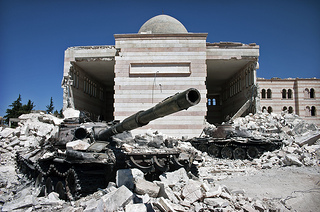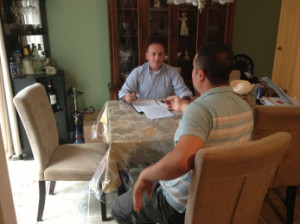World news
Syria: yesterday, today, and tomorrow

As the world contemplates what to do with Syria, I had the opportunity to speak to Shadi (last name withheld) and his mother and I asked them about what life was like in Syria before the Arab Spring, as well as other things. Shadi and his mother now live in a small town in northern New Jersey. Both Shadi and his mother were living in the US and went to visit Syria before the outbreak of the uprising in that country. They wanted to return to the US but could not and thus were stuck in the land of their birth in the midst of a revolution for 2½ years. Finally Shadi and his mother were able to escape from Syria and come back to New Jersey in June of this year to live with relatives. I sat down with Shadi and his mother for over four hours to discuss Syria in detail.
Syria: what life was like before
I specifically asked what life was like in Syria before the revolution and what was the relationship was between Muslims and Christians who make up 10% of the population? The answers I received were different from what you will hear in the mainstream media. Shadi and his mother, who are Christians, were insistent that Christians and Muslims got along without any conflict priory to the revolution. Christians though minority, had equal access to all the rights and privilege of social, academic, political, and financial aspects of Syrian society. I was told of a Syria that was getting better and more modernized under the leadership of President Bashar al-Assad (Bashar-the-lion) as compared to his father’s stricter control. Bashar introduced or expanded private banking, private hospitalization, internet, cellphones and modern amenities to Syria. The Syrian government funds itself mostly from oil exports and has no personal income tax.
The catalyst of the Syrian revolution was in Daraa, in the southwest region of Syria near the Jordan border. A handful of teenagers were arrested for vandalism by Bashar-al-Assad’s cousin, Gen. Atef Najeeb. The teenagers were brutally beaten and tortured by Gen. Najeeb’s men because they spray painted anti Assad and anti-government graffiti. When family members and tribal leaders came to Gen. Najeeb to secure the release of the 15 teenagers, the General refused and disrespected the tribal leaders and sent them home without releasing the teenagers. The Sunni residents of Daraa reacted with protest and demonstrations. The overreaction by Gen. Najeeb was later apologized for by Bashar-al-Assad, but that was far too late, Syria was already on fire. The majority of the population of Daraa is Sunni as is over 60 percent of Syria, while Bashar-al-Assad is a member of a minority Shia subgroup called Alawites.
The revolution that started in Daraa and spread to many parts of Syria was helped by soldiers who flipped sides and joined the Freedom fighters. Shadi wanted to reiterate that initially the revolution was not about Sunni vs. Shia but rather about a population that felt the oppression and corruption of political domination of one party for 40 years.
It is interesting to note that the soldiers and commanders who did abandon Assad’s army are almost exclusively Sunni. Most of the alliances that have formed between Arab nations and Syria or the rebels are on a sectarian divide, Shiites with the Assad regime and Sunnis with the rebels.
Arab Spring? Forget it!

Bader Qarmout, former candidate for the US Senate, talks about Syria with one who once lived there. Photo: Bader G. Qarmout/CNAV
When I asked Shadi about the Arab Spring and how likely is democracy to flourish in the Arab world, he said without hesitation “never, it will never happen!” When I pressed him as to why not, he said with clenched fist: “The Arabs only understand authority.” (Editor’s note: Barack Obama remade his Middle East policy on the Arab Spring. Now we can judge the results.)
The original make-up of the rebels for the first year was exclusively Syrians (Sunni) who wanted to rid the country of Shia –Alawites rule. This would have been the ideal time for the United States or other nations to support the rebels. Shadi said that if Syria was to be democratic then anyone Shia, Sunni, or Christian could become president. Since Sunni make up 60% of the population it would make sense that they would dominate politics. When I asked Shadi, what he thought about the Sunnis regaining power and running the country, he said: “that would be fine, because Christians had a good life when Sunnis were in power and currently have a good life in Syria now that Shiites are in power.” This explains why Christians are staying out of the current conflict in Syria.
I asked if it was true that Al-Qaida (the terrorist group that took responsibility for many attacks and bombings, including the US attack of September 11, 2001) members were helping the rebels fight Assad’s army, to which Shadi and his mother both emphatically said “Yes, and many of them don’t even speak Arabic.” Why would these non-Syrians want to help the rebels? Shadi believes it is because they want to turn Syria towards extremism and strict Muslim law. Shadi predicts that the Syrian population would violently reject extremism.
The Rebels are happy to accept any help they can get to defeat Assad’s regime, but conflicts between the Syrian rebels and the non-Syrian fighters is deepening and turning violent. This matter is complicated by the fact that all the rebels, Syrian and non-Syrian are under one banner and call themselves freedom fighters. Matters are further complicated by the fact that many of the fighters are a group of 200 men being independently led with little centralization.
Obama: too little, too late
When I asked Shadi about President Obama’s plan to punish Bashar-al-Assad by bombing key military sites, Shadi believed that the time for the US to assist the freedom fighters was during the first year of the uprising and now it is too late. Now that the extremists and Al-Qaeda fighters have entered Syria, the struggle has changed and no longer resembles the original intent. Shadi and his mother spoke of brutality at the hands of the foreigners and the violence they unleashed at Syrians, Christians and moderate Muslims.
Shadi spoke of a Syria that has been devastated by the 2 ½ years of civil war. Many buildings and homes have been destroyed and Syria and its people are now worse off than compared to pre-revolution. When I asked Shadi about the use of chemical weapons, he believes that Assad’s army most likely did use them, but was not sure if it was with or without Assad’s orders. The same weapons in the hands of the Al-Qaeda infiltrated freedom fighter’s army will be even more threatening to Syria, its people, and the civilized world.
China and Russia not only have economic benefits to maintain status quo in Syria but both have fought against Muslim extremist in their respective countries.
What did Shadi and his mother see as a solution to this conflict and what does the future look like for Syria? I was surprised that Shadi believed there is no solution to the current madness that Syria has spiral into. Shadi and his mother were both saddened and frightened by what is happening. The withholding of their last name was to protect the family members still in Syria. Shadi believed that if America were to attack Syria, it would only make matters worse and empower the extremists and Al-Qaeda. Shadi said to me,
I just don’t know why President Obama wants to empower the Muslim Brotherhood and Al-Qaeda in Syria, Egypt, Libya and elsewhere. The time for America’s involvement has passed. Currently there is no good outcome in Syria and if the rebels win and the extremists remain, then a violent revolution will result. If Assad was empowered and remains and puts down the uprising, things will never be the same and will most likely start up again because the extremists who are now in the country will not just leave, but rather will resort to suicide bombing. The Al-Qaeda terrorists are here to kill and destroy not build.
[subscribe2]
-

 Executive4 days ago
Executive4 days agoSecret Service chief gets no solace
-

 Executive3 days ago
Executive3 days agoWaste of the Day: Louisville Taxpayers Pay Nearly $600,000 For Empty Building’s Maintenance, Security
-

 Guest Columns4 days ago
Guest Columns4 days agoFear Itself: Democrats’ Favorite Strategy Caused Their Current Chaos
-

 Executive3 days ago
Executive3 days agoWhere is Joe Biden – or Jill?
-

 Executive1 day ago
Executive1 day agoWaste of the Day: Throwback Thursday: Cities Used Crime Prevention Funds on Soccer Games, Paper Shredding
-

 Executive2 days ago
Executive2 days agoFacile and politically motivated suggestions
-

 Civilization5 days ago
Civilization5 days agoBuild Iron Dome in the United States To Prepare for Israel’s Worst Day
-

 Executive1 day ago
Executive1 day agoBiden makes farewell whisper


“Shadi and his mother, who are Christians, were insistent that Christians and Muslims got along without any conflict priory to the revolution.”
Absolutely true. In fact shia muslims, alewites, Christians, moderate sunni and even Syria’s small jewish population are all solidly behind Assad, because he promotes religious tolerance. I was extremely happy when Parliament squashed attempts to throw more British lives away in a war as pointless and stupid as the 2003 Iraq debacle, and thankfully the US Congress now seems to be following their example. There is no gain for the west in backing Syria’s rebel scum.
Know anything about those so-called rebels?
The word I get is that some of them were the ones who did that gas attack. They were induced to do this by Prince Bandar bin-Sultan of Saudi Arabia. Who has several motives for trying to stir up another American intervention.
“Know anything about those so-called rebels?”
Yep, quite a lot in fact. That’s why I hope Assad wins. These are not people we want in charge of Syria.
Were any of them at all ever the least bit praiseworthy or trustworthy? Bader Qarmout’s subject seemed to think they might have been – at first. Not today.
“Were any of them at all ever the least bit praiseworthy or trustworthy?”
Honestly? No.
I’m no great fan of Ba’athist Arab nationalism, but compared to every other form of government that exists in the Arab world it’s positively admirable. I’m Team Assad all the way and I don’t think his overthrow is something we’d be grateful for a year down the road. Nor would Syria’s religious minorities, gays, women or indeed anyone else who isn’t a bearded shagwit.
I would say, better the devil (or demon) we know, than one we don’t.
A/K/A “Don’t jump from the frying pan into the fire.”
You’ll never agree with what I say next, but I’ll say it anyway: some day, and soon, God Himself will sort things out in Syria, and all throughout the Middle East, and the world. But right now, I don’t think boarding a ship and then an LCVP to hit a Syrian beach, or sending other men to do the same, is in line with being His instrument to that end.
Rumors have reached me that Bandar bin Sultan set up that attack. He did this, so the story goes, to start a war, in which The Carlyle Group, of which he is alleged to be a member, can “clean up” by selling more weapons. Would you happen to know anything about whether that has any element of truth?
“He did this, so the story goes, to start a war, in which The Carlyle Group, of which he is alleged to be a member, can “clean up” by selling more weapons.”
When western governments (usually unwisely) ship weapons to rebel groups they tend to buy surplus stocks from eastern European NATO members such as Hungary. This has two advantages: The rebels get the AKMs and RPG-7s they’re accustomed to, and modern western weapons don’t get into the hands of lunatics. We learned our lesson after Reagan sent Stingers to Afghan terrorists in the 1980s – some of those Stingers were being recovered in at least borderline working order in 2011.
The Carlyle Group invests in defence companies, but it isn’t one. It’s not going to make any money out of a shipment of old Kalashnikovs to anti-Assad nutters. That’s not to say I reject the idea of Saudis – including members of the house of Saud – potentially being involved in AQ’s false flag chemical attacks in Syria. I just wouldn’t suspect BBS and I wouldn’t suspect commercial motives.
Charlotte Laborde liked this on Facebook.
PolitiCollision liked this on Facebook.
>Yep, quite a lot in fact. That’s why I hope Assad wins.
If I were religious, I’d say “Amen to that”. It’s not, so I just stroke my Maneki-neko and hope for the best…